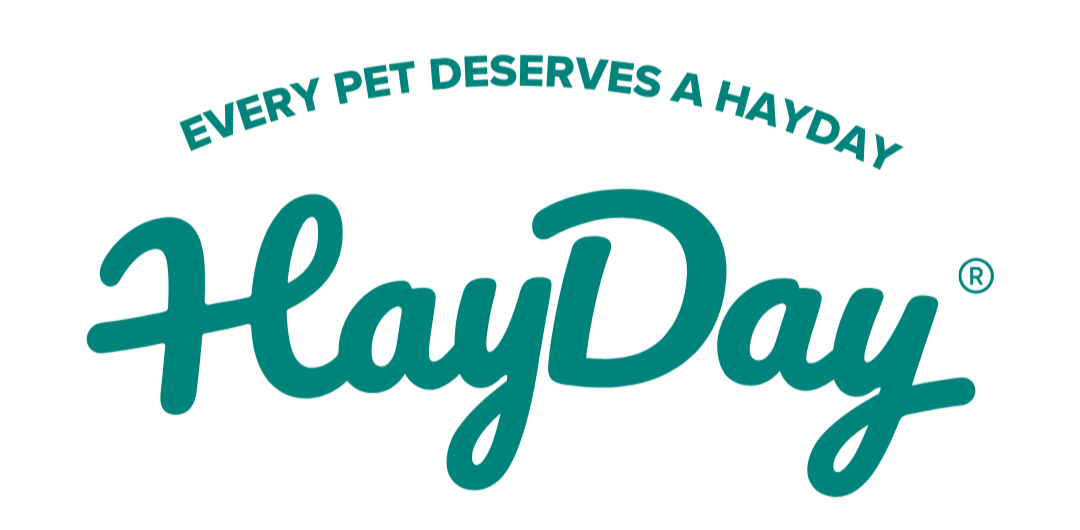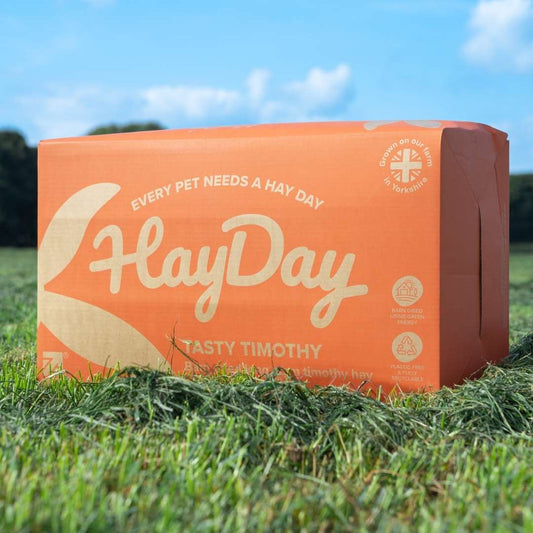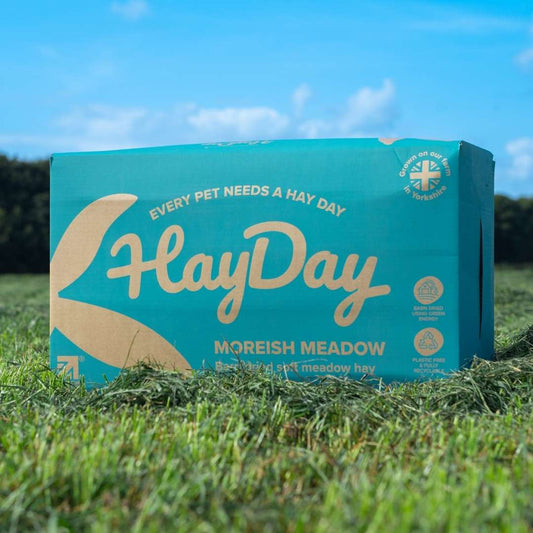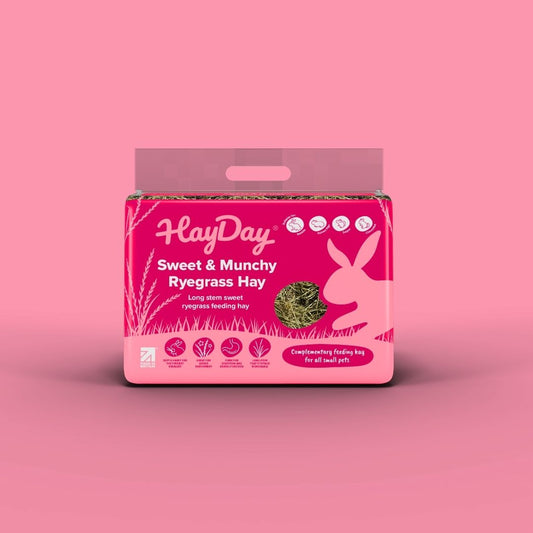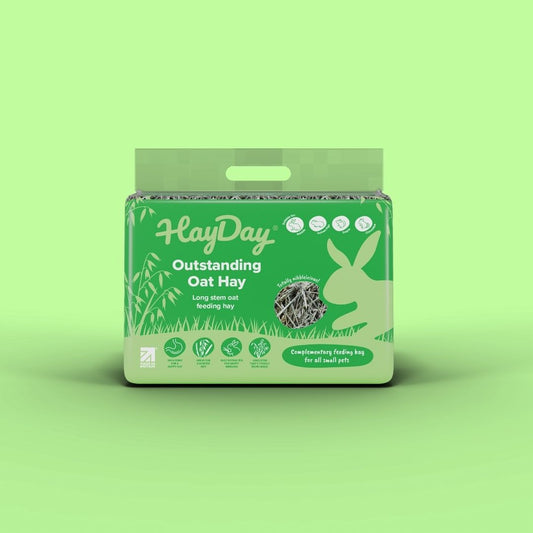Timothy Vs Ryegrass Hay - Which is the best hay to feed my small animal?
When it comes to choosing hay for your small pet, it’s always good to consider these five things:
-
Taste
-
Texture
-
Palatability
-
Nutrition
-
Age of rabbit (or other small pets)
Providing a variety of hay types and textures is crucial for small herbivorous pets like rabbits, as it offers stimulation and flavour diversity in their diets.
Taking into account your furry friend’s specific taste buds can help you narrow down the right hay for them.
Ryegrass Hay and Timothy Hay are just two different grass species that you can feed your rabbits, guinea pigs and other small animals.
But if you’re new to the small pet world, it can be hard to know what to feed and you’re possibly wondering: What is the difference between Timothy Hay and Ryegrass Hay, which is the best hay variety, how should you feed it and how to incorporate it into your small pets diet?
Ryegrass & Timothy Hay Comparison Overview
In our helpful guide we will explore these different types of hay including,
-
The nutritional composition of both Timothy Hay and Ryegrass Hay
-
The nutritional differences between both grass species
-
How to feed hay, and how frequently
-
The benefits of feeding high quality hay to your small pet
Unsure of which hay you should trial for your small pet? Try a HayDay Taster Pack > 50/50 Timothy Hay and Meadow Hay, you’re guaranteed to find a hay which sends your small pet hopping mad!
Timothy Hay vs Ryegrass Hay - Overview
Eating hay plays a huge role in keeping your small animals happy and healthy, for life. But here’s a quick overview of what to expect from this guide:
-
Timothy Hay and Ryegrass Hay are similar in texture (coarse with long stems) however their nutritional qualities differ. Timothy Hay is high in protein and fibre, whereas Ryegrass Hay is typically higher in protein - but don’t worry, both are beautifully rich in colour (aka extremely green!)
-
Both Timothy and Ryegrass Hay are great for your rabbits, guinea pigs, chinchillas and degus diet’s as their coarse and stalky texture helps support your small pet’s complex dental health, digestive health and gut health. The fibre content in Timothy Hay and Ryegrass Hay also plays a crucial role in energy, weight management, and overall health for these animals.
-
Both hay types can stay fresh for up to a year, given they are stored correctly. A dark, dry and well ventilated room is recommended, with a breathable box being ideal for hay storage.
What is Ryegrass Hay?
Ryegrass Hay is a type of grass suitable for rabbits, guinea pigs, chinchillas and degus - when fed in moderation, following feeding guidelines.
It’s long, green and stalky texture makes it a particularly palatable option for your small pets with its enhanced nutrition and sweet taste.
As a feeding hay for your small pet, it is best when used in addition to their everyday hay (i.e. Timothy Hay or Meadow Hay) or to top up nutrition (if they’re ill or unwell for example or just wanting a more varied diet) where required. Ryegrass Hay often contains seed heads, which add to its nutritional value and variety for small animals.
Is Ryegrass Hay Good for my Small Animals?
Ryegrass Hay is better fed in smaller quantities, alongside a primary hay such as Timothy Hay or Meadow Hay.
Ryegrass Hay is sweet to taste - think of it like a sweet treat! Our nutritionist Briony has recommended "sprinkling it on top of different hay varieties which will help enrich their diet with slightly higher protein."
What are the benefits of Ryegrass Hay for Small Pets?
When choosing HayDay's Sweet and Munchy Ryegrass Hay, these are just some of the things which makes it so great to feed your small pets:
| Ryegrass Hay | |
| Coarse Stems | ✓ |
| Soft Texture | ✗ |
| Sweet Taste | ✓ |
| Barn-Dried | ✓ |
| Dust Extracted | ✓ |
| Great for dental and digestive health | ✓ |
| Suitable for small pets | ✔ |
What is Timothy Hay?
Timothy Hay is a type of grass species, made from timothy grass, which is high in protein and fibre which will aid your small pet’s digestion and gut health (only healthy, golden poops round here please!)
With its naturally coarse and long stems, it is loved within the rabbit and guinea pig community for that exact reason!
Purchase now > High quality, palatable Timothy Hay for small pets.
Is Timothy Hay Good for my Small Animals?
Timothy Hay is a great addition to your small pet's diet due to it's coarse and crunchy stems - adored by all! Here are the characteristics of Timothy Hay:
-
High fibre
-
High protein
-
Highly palatable
-
Coarse, long stems
-
Beautifully green in colour
Timothy Hay and Meadow Hay should represent 80-90% of your small pet's diet, and if you wish, you can feed Ryegrass Hay alongside these two options for added diversity in taste and texture.
At HayDay, you can also be pleased to know:
-
We barn dry our hay when needed for guaranteed high quality all year round
-
Our first-cut Timothy is a great forage to help your small animal's digestive and dental health
-
We work closely with our in house nutritionist Briony to ensure that you're feeding your small pet's the best
Refer to our feeding guidelines for further advice.
What are the Differences Between Timothy Hay and Ryegrass Hay
The key differences between Timothy Hay and Ryegrass Hay are:
| Tasty Timothy Hay | Ryegrass Hay | |
| Coarse, Long Stems | Yes | Yes |
| Nutritional Value | High | High |
| Great for dental and digestive health | Yes | Yes |
| Protein Levels | High | Moderate |
| Dust Extracted | Yes | Yes |
| Barn-dried | Yes | Yes |
| How to feed | Unlimited supply, each day | In addition to other hay types - as a top up |
Here is our in-house nutritionist Briony's advice on feeding Timothy Hay and Ryegrass Hay:
"When choosing a type of hay, there are two key considerations - what it provides in terms of nutrients and what it offers in terms of its functional role for maintaining dental and digestive health.
From a functional point of view, the overall fibre level and type of fibre is important for small animals. Insoluble fibre content (fibre which cannot be broken down) is key for helping to maintain digestive and dental function. This is where our Tasty Timothy and Moreish Meadow hays are particularly useful as they tend to have higher fibre contents in comparison to our Ryegrass Hay. This is why these hays are often recommended to form the basis of your small pet’s hay ration, while Ryegrass Hay is recommended in small quantities offered alongside this for enrichment."
Other Types of Hay to Consider
Meadow Hay
It's soft and palatable texture means it's not only a great tasting feeding hay, but it also pairs as a bedding hay for your rabbits or guinea pigs too!
Suitable for even the fussiest of pets, meadow hay is typically a blend of meadow grasses. At HayDay, our Moreish Meadow is 100% natural for your small pets with its mix of traditional hay meadow grasses which are high fibre to support gut health. Lets not forget: it's long stems also assist your small pet's ever growing teeth too!
Shop now > High quality, long stem Meadow Hay for small pets.
Alfalfa Hay
Alfalfa Hay is a legume, as opposed to a grass and stems from the same family as clovers and peas! An excellent forage choice for young rabbits, growing or breeding small pets due to its high protein and calcium content to support health and development.
As well as being suitable for small pets that are ill or recovering from injury, its coarse, green and leafy texture is guaranteed to add enrichment to most small pets' diets. Alfalfa Hay can be fed ad-lib, in addition to other forage for adult small pets or to top up nutrition for those fur friends needing a little health kick.
Shop 1kg hay boxes now > Premium, barn dried Alfalfa Hay for small pets
A Typical Rabbit Diet
Remember, a typical rabbit diet should consist of:
-
80-90% premium quality hay
-
An (approximately) egg-cup full of pellets
-
A handful of leafy greens
-
Fresh water
For fussy small pets, try introducing our Meadow Hay to their diet as it is soft in texture and extremely palatable. Meadow Hay also pairs perfectly as a bedding hay too - it's a 2-in-1 product! Win win!
How to Guarantee Quality Hay
Finding hay that is barn dried, dust free and all in all just the best quality hay for your small pet can be hard. At HayDay, we have invested in new, innovative and sustainable farming practices to ensure high quality hay with every box.
Drying Sheds
Powered by green energy, our drying sheds assist us when the British inclement weather conditions can't.
Traditional farming techniques include mowing the hay and leaving it in the field for 5 days to dry naturally. Albeit, the British weather doesn't always allow for this - which is why we invested into drying sheds. Our facilities allow us to perfectly dry the hay for 3-5 days allowing for consistent quality hay each time - all year round!
Hay Storage and Handling Tips
To ensure that the quality of your hay isn't compromised, it is best practice to store your hay in a dark, cool and well ventilated room. If you store your pet's hay correctly, the quality and freshness can last for as long as a year!
Here are some of the top tips we advise to prevent your hay from mould and from spoiling:
-
Allow it to breathe - our hay boxes are a great solution for this
-
Place it in a well ventilated room
-
Store your hay in a spare bin or container to avoid any mess
-
Ensure it's stored in a dark, cool and well ventilated space
Click here > for more tips on storing your small pets hay correctly.
Summary
In conclusion, Timothy Hay and Ryegrass Hay are two great forage options to feed your small pet. Whilst you can just feed one type of hay, it is very common for small pet owners to feed a combination of hays - this will not only help to satisfy both nutritional and functional requirements but also may offer additional enrichment.
Here's a feeding top tip from our nutritionist, Briony, to conclude, on feeding forage to your small animals,
"From a functional point of view, the overall fibre level and type of fibre is important for small animals. Insoluble fibre content (fibre which cannot be broken down) is key for helping to maintain digestive and dental function. This is where our Tasty Timothy and Moreish Meadow Hay are particularly useful as they tend to have higher fibre contents in comparison to our Ryegrass Hay. This is why these hays are often recommended to form the basis of your small pet’s hay ration, while Ryegrass Hay is recommended in smaller quantities offered alongside this for enrichment."
Relevant Advice
Frequently Asked Questions
Can I use feeding hay for bedding?
For example, you can use Timothy Hay as bedding - yes. However, there are other suitable feeding hay's to be used as bedding such as Meadow Hay. Meadow Hay is naturally softer in texture and therefore pairs as a toasty bed for rabbits or guinea pigs.
Is Meadow Hay similar to Ryegrass Hay?
Meadow Hay and Ryegrass Hay are two different types of hay when it comes to taste and texture. Meadow Hay has a softer texture as opposed to Ryegrass Hay which is coarser - but both are two palatable options for your small pets.
We would also recommend feeding Meadow Hay as your small pet's main fibre source, whereas Ryegrass Hay should be fed in addition to other hay types (such as Timothy or Meadow Hay) to add enrichment or to top up nutrition where required.
